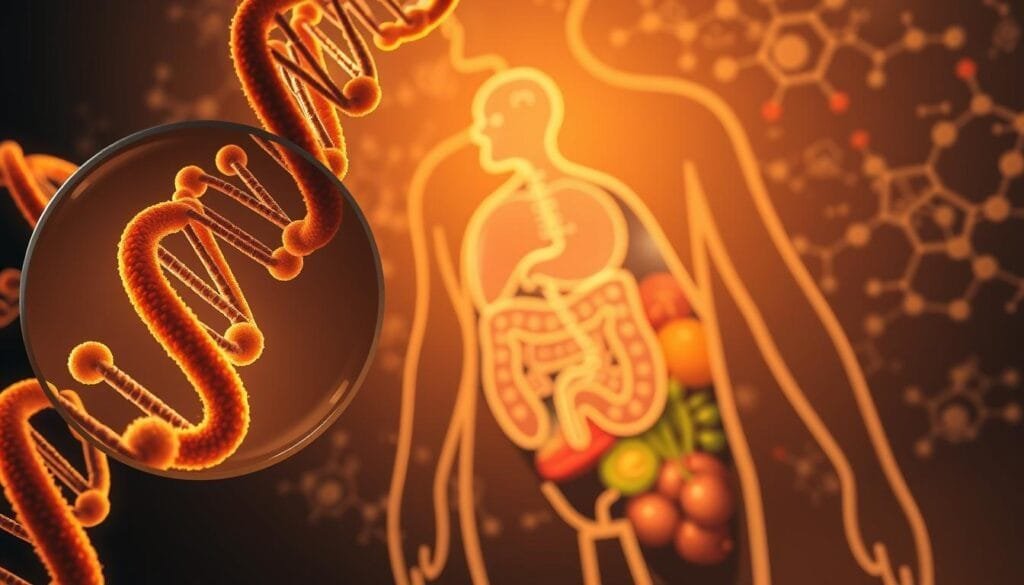Personalized nutrition is changing how we approach healthy eating. It considers your unique body, lifestyle, and goals. This tailored approach helps improve health, lose weight, and boost energy levels.
Modern science is revolutionizing our eating habits. It’s moving away from one-size-fits-all plans that often disappoint. Instead, it focuses on how to find a diet that works for you personally.
A ZOE study with 15,000 participants showed impressive results. People following a personalized plan for 3 months lost 9.4 pounds on average. Also, 80% felt more energetic without feeling hungry.
Traditional diets often fail because they ignore individual differences. That’s why learning how to find a diet that works for you is essential. Let’s explore why this happens and how to avoid it.
You can transform your relationship with food. Discover how to find a diet that works for you and create a plan that truly fits your body and lifestyle. It’s time to enjoy eating while meeting your health goals.
Key Takeaways
- Personalized nutrition considers individual factors for targeted recommendations
- Traditional one-size-fits-all diets often fail due to individual differences
- Recent studies show significant benefits of personalized nutrition plans
- Tailored approaches can lead to weight loss and increased energy
- Finding your ideal diet involves understanding your body’s unique responses
- Sustainable eating plans focus on long-term lifestyle changes
- Modern technology plays a crucial role in diet customization
Understanding Personalized Nutrition Basics
Personalized nutrition is changing our approach to diet. It considers our unique bodies and lifestyles. This method isn’t a one-size-fits-all plan.
What Makes Personalized Nutrition Different
Personalized nutrition focuses on individual food responses. It’s based on your body’s specific needs. The Food4Me Study showed personalized advice led to healthier eating patterns.
The Science Behind Individual Food Responses
Our bodies react differently to foods. ZOE scientists found big differences in how people respond to food. This helps create tailored food recommendations.
It’s not just about calories. It’s about how your body processes different nutrients.
Role of Modern Technology in Diet Customization
Diet customization technology is advancing quickly. It uses data from many sources to create personalized plans. This includes genetic info, blood tests, and glucose monitoring.
A study by Zeevi et al used machine learning. It predicted how blood sugar responds to different foods.
| Personalized Nutrition | Traditional Diets |
|---|---|
| Tailored to individual needs | One-size-fits-all approach |
| Based on scientific data | General recommendations |
| Uses advanced technology | Relies on standard guidelines |
| Considers genetic factors | Ignores genetic differences |
Personalized nutrition is an exciting, growing field. It aims to make diets more effective and easier to follow. Ongoing research will reveal more about eating for our unique bodies.
Check This:
- How to Start Mediterranean Diet Plan: A Beginner’s Guide to Healthy Eating!
- How to Eat Healthy When Eating Out: Smart Tips for Guilt-Free Dining!
Why One-Size-Fits-All Diets Often Fail
Generic diets rarely work long-term. Studies reveal 95% of people regain weight within 5 years. Let’s uncover why these diets disappoint so many.
Individual Metabolic Differences
Our bodies handle food in unique ways. Metabolic differences can cause up to 30% variance in calorie needs. This explains why some diets work for friends but not for you.
Genetic Factors in Nutrition
Genes strongly influence how we respond to food. Research shows 40-70% of weight loss success links to genetic variations. Some people process fats well, while others struggle with carbs due to genetics.

Impact of Gut Microbiome on Diet Success
Your gut microbiome and diet are closely linked. Trillions of gut microbes affect how you digest food and absorb nutrients. A diet that works for one person might cause issues for another.
| Factor | Impact on Diet Success |
|---|---|
| Metabolic Differences | 30% variance in calorie needs |
| Genetic Factors | 40-70% influence on weight loss |
| Gut Microbiome | Affects nutrient absorption and digestion |
These factors explain why generic diets often fail. Personalized nutrition plans can lead to 25% better health outcomes. Tailoring your diet to your unique needs increases your chances of success.
How to Find a Diet That Works for You
Finding the right diet is key to your health and wellness. Let’s explore steps to create an eating plan just for you. We’ll look at eating patterns, food responses, and tracking progress.

Analyzing Your Current Eating Patterns
Keep a food diary for a week. Write down everything you eat and drink, including portions and times. This helps spot habits, triggers, and areas to improve.
Look for patterns in your eating. Do you snack late at night? Do you skip breakfast? These details matter.
Understanding Your Body’s Response to Foods
Notice how foods affect your energy, mood, and digestion. Some people do well on a Mediterranean diet. Others feel better eating low-carb.
ZOE’s at-home tests can help. They check your blood fat, blood sugar, and gut health. This shows how your body reacts to food.
Tracking Progress and Making Adjustments
Once you pick a diet, track your progress often. Watch for changes in weight, energy, and overall health. Be ready to adjust based on results.
For example, you might follow the DASH diet. If your blood pressure doesn’t improve, you may need less salt.
- Use a food tracking app to log meals and monitor nutrient intake
- Take regular body measurements and progress photos
- Adjust portion sizes or macronutrient ratios as needed
- Consult with a healthcare provider for personalized guidance
Finding the right diet takes time and patience. Listen to your body as you create your perfect eating plan. Keep trying until you find what works best for you.
The Role of Testing and Technology in Personalized Nutrition
Nutrition testing technology has changed how we approach diet and health. We can now tailor our eating habits to our unique bodies. These advancements are helping millions seek better health.
One in five early deaths worldwide is linked to poor diet. This fact shows we need better nutrition strategies. Personalized nutrition might be the answer.
Genetic testing can show how our bodies process different nutrients. It costs as little as $199. Microbiome tests offer insights into our gut health. They range from $100 to $1,000.
These tools help create diets that work with our individual biology. Research supports this personalized approach. A Dutch study found tailored advice reduced body fat in older adults.
| Technology | Cost Range | Benefits |
|---|---|---|
| Genetic Testing | $199+ | Reveals nutrient processing |
| Microbiome Testing | $100-$1,000 | Provides gut health insights |
| AI-Driven Diet Plans | Varies | Tailors meals to individual needs |
These advancements are exciting, but choose tests backed by scientific studies. As nutrition science grows, we’ll see more precise ways to personalize diets. This will help improve our health even more.
Conclusion
Personalized nutrition offers many benefits for long-term success. The one-size-fits-all approach often fails, with 95% of dieters regaining lost weight. Understanding our unique needs leads to individualized eating success.
ZOE’s research shows impressive results from tailored nutrition programs. People lost an average of 9.4 pounds in three months. 80% reported increased energy levels.
Healthy diets should be sustainable for life. Fiber-rich fruits, vegetables, whole grains, and lean proteins help maintain fullness. These foods don’t add excessive calories.
Focus on personalized nutrition and gradual changes. This approach can break the cycle of fad diets. It leads to real, long-lasting health improvements.
Source Links
- https://zoe.com/learn/what-is-personalized-nutrition – Personalized Nutrition Explained: Why Everyone Is Different
- https://www.mayoclinic.org/healthy-lifestyle/weight-loss/in-depth/weight-loss/art-20048466 – Weight loss: Choosing a diet that’s right for you

